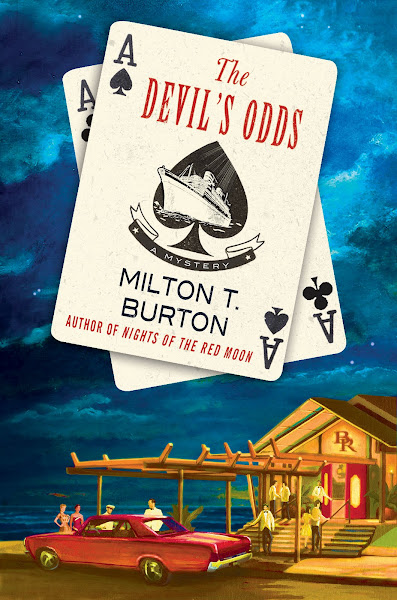 Yesterday, while I was reading my friend Joe Prentis's blog, which is linked here, I came across an article that reminded me of something I'd seen years ago and have never been able to get out of my mind, something that often comes back to me when I wake in those long hours after midnight and sleep won't return. Just a bit of grafitti. . .
Yesterday, while I was reading my friend Joe Prentis's blog, which is linked here, I came across an article that reminded me of something I'd seen years ago and have never been able to get out of my mind, something that often comes back to me when I wake in those long hours after midnight and sleep won't return. Just a bit of grafitti. . .Back in the mid-1990s a local attorney and history buff here in Tyler named Randy Gilbert bought the old 1880s county jail, which had been converted to a fleabag hotel in the early years of the 20th century, and set about restoring it as a law office. While the work was underway I went through the building several times, and on one trip Randy pointed out to me some graffiti that had been scribbled on the cement of the outer walls back in the cell-block area. All were interesting, but the one that has stuck in my mind read:
"R. Druse, Jan. 1, 1916. Pen Bound."Nineteen-sixteen---a time when convicts feared the trip down to Huntsville about as much as they feared the penitentiary itself. The reason was Bud Russell, longtime transfer agent for the Texas prison system. Known as "Uncle Bud" to the convicts, there was nothing warm, cuddly, or familial about the man. In a career that spanned better than four decades, he ranged the length and breadth of the state, logging nearly four million miles as he hauled over a hundred thousand men down to begin their sojourns in the blistering sun of the state's cotton fields. Here is how Time Magazine described him in 1940, shortly before his retirement:
"Big, red-faced, rawboned Uncle Bud Russell, 62, is Texas' prison transfer agent. Armed to the teeth (two six-shooters, two gas guns, blackjack, brass knuckles), he likes to ride his charges to jail with a Thompson Submachine gun between his knees. . ."I have no idea what Druse's crime might have been, but I do believe it is a safe assumption that he arrived at his destination. Russell always said he would die before he gave up a prisoner. "You were born about forty years too late to get tough with me," he would tell each man as he boarded the steel mesh cage welded to the bed of his flatbed truck. Uncle Bud hauled Clyde and Buck Barrow and Raymond Hamilton---all with nary a hitch, so I doubt that this unknown young miscreant from Tyler even caused him to work up a sweat. Here is how famed blues artist Lead Belly, who made two trips with him, described the experience:
But still I cannot help but wonder who R. Druse was and what obscure destiny was his. I would like to know too what combination of jauntiness and fatalism made him write that "Pen Bound" after his name. The Texas prison system was a terrible place in those days, and I wonder if he survived the experience. Many didn't. The guards could kill with impunity, and at least a few of them were sadists who knew no greater moment of joy than when they had tormented some hapless convict into desperate flight and then felled him with a load of buckshot. Did this stay in the pen reform Druse, or did he become a career criminal? Did he go on to become a father and grandfather? When did he die and where? These are questions that will never be answered. All I know of the man is that he was alive and here in Tyler, Texas, on New Year's Day back in 1916, waiting for the arrival of Uncle Bud and his Midnight Special.
"Let the Midnight Special shine her light on me
Let the Midnight Special shine her ever-lovin' light on me
"Here come Bud Russell," How in the world do you know?"
Well he know him by his wagon, and his forty-fo'
Big gun on his shoulder, big knife in his hand
He's comin' to carry you back to Sugarland."
You might well ask what this has to do with literature. A similar name scratched onto the glass of a window of the old Oxford, Mississippi, jail back in the 1850s, this one the name of a young girl who was the daughter of a sheriff and lived on the premises, inspired one of the great short stories of the English language, William Faulkner's "The Jail." If you haven't read it, I urge you to do so. It is found in The Portable Faulkner, which was edited by Malcolm Cowley.
After following the imagined vissitudes of the girl's life, from adolescence to old age, at the end of the story Faulkner goes back to give her motive for marking at that pane back in the days of her youth:
"... since you know not that there is no time: no space: no distance: a fragile and worthless scratching almost depthless in a sheet of old barely transperent glass. . . there is the clear and undistanced voice as though out of the antenna skeins of radio. . . across the vast instantaneous intervention, from the long long time ago: 'Listen stranger; this was myself: this was I.'"



